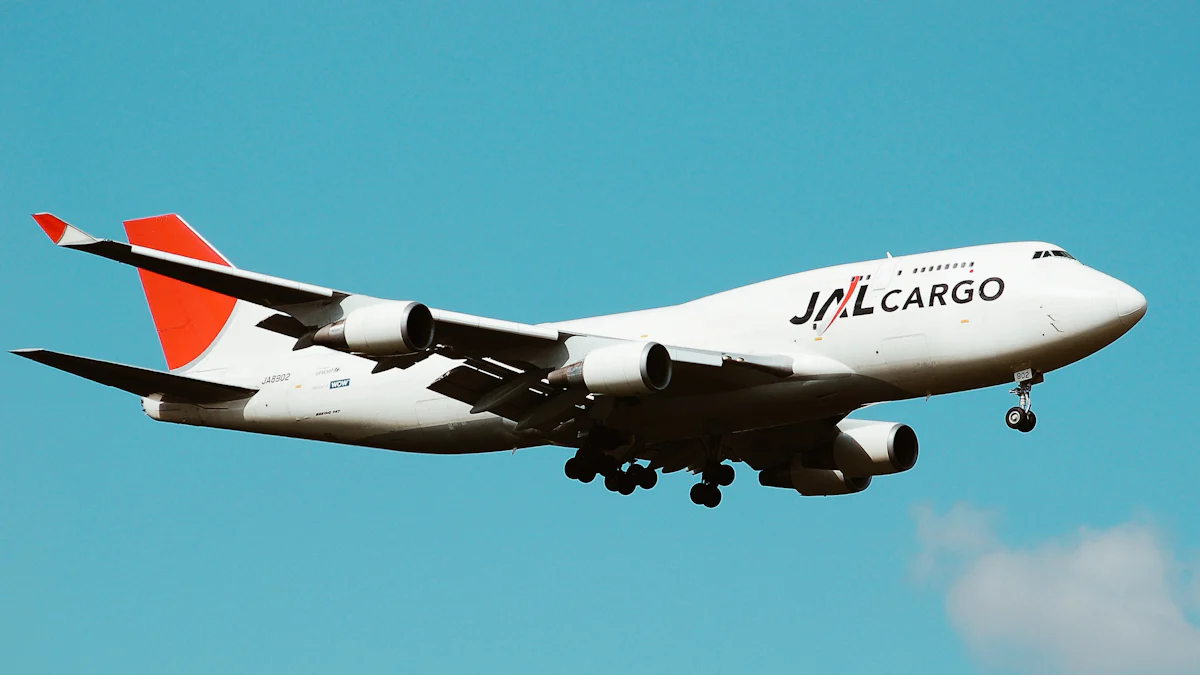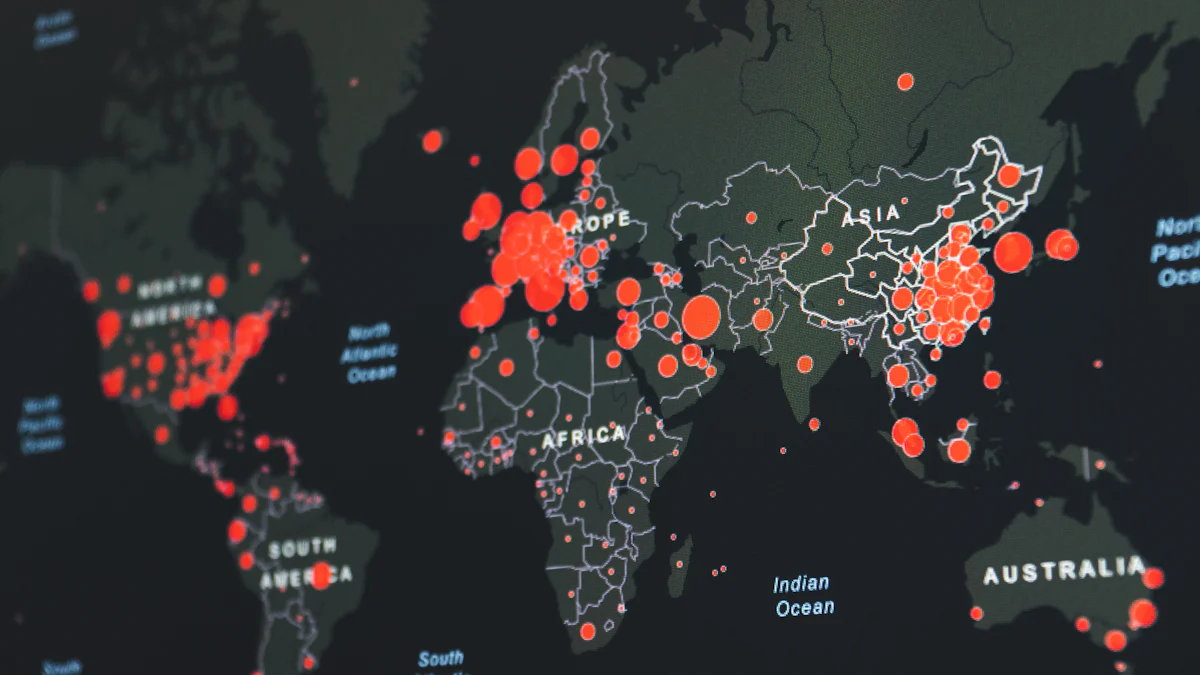Global Trends Analysis of Air Freight Logistics

Air freight logistics play a pivotal role in facilitating global trade by ensuring swift and efficient transportation of goods across borders. The analysis aims to delve into the intricate workings of this dynamic industry, shedding light on emerging Global Trends and market projections. Understanding key terms and concepts is essential for grasping the nuances of air freight logistics, from market size to growth drivers. Let's embark on a journey through the realm of air cargo, exploring its significance in shaping the future of international commerce.
Market Overview
Market Size and Growth
Historical Market Size
In the past, the air freight market witnessed substantial sizes, reflecting the demand for efficient global transportation solutions.
Current Market Size
Presently, the air cargo industry showcases a robust market size, indicating its pivotal role in international trade facilitation.
Projected Market Growth
The future of air freight logistics appears promising with a projected significant growth trajectory. This growth is attributed to increasing demands for swift and reliable transportation services worldwide.
Key Market Drivers
Technological Advancements
Advancements in technology are revolutionizing the air freight sector, enhancing operational efficiency and customer satisfaction through innovative solutions.
Increasing Global Trade
The surge in global trade activities is a key driver propelling the growth of the air cargo industry. The need for efficient cross-border logistics solutions continues to drive market expansion.
E-commerce Boom
The booming e-commerce sector is reshaping consumer behaviors and expectations, driving higher demand for expedited shipping services globally.
Market Challenges
Regulatory Issues
Navigating complex regulatory frameworks poses challenges for air freight companies, requiring strategic compliance management strategies to ensure seamless operations.
Environmental Concerns
Environmental sustainability has emerged as a critical challenge for the air cargo industry. Mitigating carbon emissions and adopting eco-friendly practices are essential for long-term viability.
Capacity Constraints
Managing capacity constraints amidst fluctuating demands remains a pressing challenge in air freight logistics. Balancing supply and demand dynamics is crucial for operational efficiency and service quality.
Trends in Air Freight Logistics

Technological Innovations
Innovations in the air freight industry are driving efficiency and reliability, shaping the future of logistics. The integration of Automation and AI technologies streamlines operations, optimizing route planning and cargo handling. These advancements enhance supply chain visibility and responsiveness, ensuring timely deliveries and improved customer satisfaction.
Blockchain technology is revolutionizing logistics by providing secure and transparent data management. By leveraging blockchain in Logistics, companies can enhance traceability, reduce fraud risks, and streamline documentation processes. This innovation fosters trust among stakeholders and strengthens the integrity of air freight operations.
Sustainability Trends
Sustainability is a growing focus in air freight logistics, aligning with global environmental initiatives. Embracing Green Logistics practices involves reducing carbon emissions, minimizing waste generation, and promoting eco-friendly packaging solutions. Companies prioritizing sustainability contribute to a greener future while meeting consumer expectations for environmentally conscious supply chains.
Efforts to reduce the Carbon Footprint of air freight operations are paramount in mitigating environmental impact. Implementing fuel-efficient aircraft, optimizing flight routes, and investing in renewable energy sources are key strategies for carbon footprint reduction. By adopting sustainable practices, the air cargo industry can pave the way for a more eco-conscious transportation sector.
Shifts in Trade Routes
The landscape of trade routes is evolving due to changing market dynamics and geopolitical influences. Emerging Markets present new opportunities for air freight growth, requiring strategic partnerships and operational flexibility to capitalize on emerging demands. Adapting to these market shifts enables companies to expand their global reach and cater to diverse customer needs effectively.
Geopolitical events have a significant impact on trade routes, influencing regional trade patterns and logistical challenges. Navigating geopolitical complexities demands agility and risk management strategies to ensure uninterrupted supply chain operations. By monitoring geopolitical developments closely, air freight stakeholders can proactively address disruptions and optimize route planning for enhanced efficiency.
Regional Analysis

North America
Market Size and Growth
North America contributes significantly to the air freight market, showcasing substantial growth in recent years.
The market size in North America is projected to reach USD 151.22 billion by 2024, reflecting a robust upward trend.
With a CAGR of 5.92%, the region is expected to witness continued growth, reaching USD 201.57 billion by 2029.
Key Players
Major players in North America's air freight sector play a pivotal role in shaping the regional market landscape.
Companies like FedEx, UPS, and DHL are prominent figures driving innovation and service excellence in the air cargo industry.
Europe
Market Size and Growth
Europe stands as a key player in the global air freight market, demonstrating steady growth and market resilience.
The region's market size is on an upward trajectory, poised to expand significantly over the forecast period.
Key Players
Leading companies in Europe contribute substantially to the air cargo sector's growth and operational efficiency.
Key players leverage advanced technologies and strategic partnerships to enhance their competitive edge in the European market.
Asia-Pacific
Market Size and Growth
Asia-Pacific emerges as a dominant force in the air freight industry, commanding a substantial market share globally.
With the largest revenue contribution among analyzed regions, Asia-Pacific continues to drive market expansion.
Key Players
Key players in Asia-Pacific demonstrate remarkable performance, fostering innovation and operational excellence within the region.
Leveraging extensive networks and cutting-edge solutions, these companies shape the future of air freight logistics across Asia-Pacific.
Rest of the World
Market Size and Growth
The air freight market in the Rest of the World region showcases a promising growth trajectory, with significant market size projections. By 2024, the market is expected to reach USD 100 billion, reflecting a robust upward trend. This growth is further anticipated to continue, reaching USD 150 billion by 2029.
Key Players
Key players in the Rest of the World region play a pivotal role in shaping the global air freight landscape. These companies contribute substantially to market growth and operational excellence, leveraging advanced technologies and strategic partnerships to enhance their competitive edge within the region.
Competitive Landscape
Major Players
FedEx
FedEx, a global leader in logistics services, boasts an extensive network and cutting-edge technologies that drive operational excellence. The company's commitment to innovation and customer-centric solutions positions it as a key player in the air freight industry.
UPS
UPS, renowned for its reliable delivery services and advanced supply chain solutions, plays a pivotal role in shaping the competitive landscape of air freight logistics. With a focus on sustainability and efficiency, UPS continues to set industry standards.
DHL
DHL stands out as a prominent player in the air cargo market, offering comprehensive logistics solutions and unparalleled global reach. The company's strategic initiatives and emphasis on quality service underscore its significance in the competitive arena.
Emerging Players
Startups and Innovators
Startups and innovators are driving disruption and transformation in the air freight sector through agile practices and novel technologies. These emerging players bring fresh perspectives and innovative approaches to meet evolving market demands.
JUSDA's Advantages in Air Freight Products
Overview of JUSDA
JUSDA Supply Chain Management International Co., Ltd., a leading supply chain technology management platform service company, revolutionizes air freight logistics with its end-to-end solutions. By integrating raw material procurement, manufacturing, and distribution seamlessly, JUSDA ensures efficient global transportation services.
Unique Selling Points
JUSDA's core competitive advantage lies in its real-time collaborative platforms and intelligent supply chain systems. Through the JusLink platform, the company optimizes resource utilization and enhances decision-making processes across the supply chain. This unique approach sets JUSDA apart as an industry innovator.
Case Studies and Success Stories
Case Study: Rest of Asia-Pacific Market Emergence
In exploring new markets like the Rest of Asia-Pacific region, JUSDA demonstrates agility and strategic foresight. By capitalizing on emerging opportunities and leveraging advanced technologies, JUSDA expands its global footprint while delivering exceptional value to customers.
Future Forecasts
Market Projections
Short-term Forecasts
The short-term outlook for the air freight market anticipates a steady growth trajectory driven by increasing global trade demands and technological advancements. Companies like FedEx, UPS, and DHL are expected to maintain their market dominance through innovative solutions and strategic partnerships.
Long-term Forecasts
Looking ahead, the long-term forecasts for the air cargo industry project sustained growth with a focus on sustainability and operational efficiency. Major players such as The Emirates Group, Cathay Pacific Airways Limited, and Cargolux Airlines International Sa are poised to capitalize on emerging opportunities in the market.
Emerging Opportunities
Technological Advancements
Technological advancements present significant opportunities for air freight companies to enhance their service offerings and streamline operations. Leveraging advanced technologies like IoT and big data analytics can optimize supply chain management processes, ensuring seamless end-to-end logistics solutions.
New Market Entrants
The entry of new players such as Bolloré Logistics, DB SCHENKER, Deutsche Post AG, and DSV Panalpina into the air freight market signifies a shift towards increased competition and innovation. These emerging entrants bring fresh perspectives and agile practices that drive industry transformation and customer-centric solutions.
Summarize the significant growth and impact of the air freight market, highlighting its pivotal role in global trade facilitation.
Stakeholders must adapt to evolving trends and technological advancements to remain competitive and meet consumer demands effectively.
The future of air freight logistics holds immense opportunities for innovation and sustainable practices, driving industry growth and operational excellence.
Explore further insights into the dynamic landscape of air cargo logistics to stay informed and prepared for the transformative journey ahead.
See Also
Cracking the Code: Trends in Logistics Risk Analysis
Tomorrow's LTL Freight: An Extensive Examination
Revealing Sea Freight Logistics: 2024 Innovations
